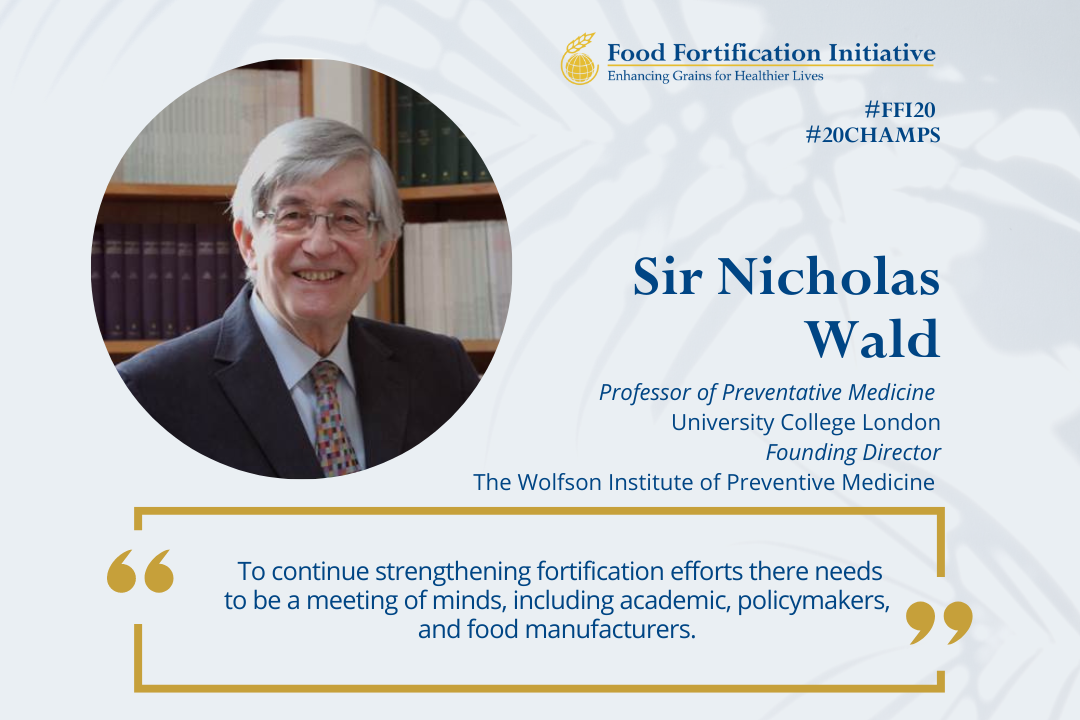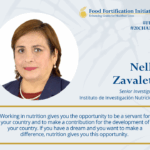Professor of Preventive Medicine at University College London and Founding Director of the Wolfson Institute of Preventive Medicine

FFI: How did you become interested in nutrition?
Wald: I was interested in nutrition because as an epidemiologist, nutrition is a key factor in understanding the distribution and causes of disease throughout the world.
FFI: What inspired you to become involved with food fortification?
Wald: I was interested in the factors that influenced LDL cholesterol and blood pressure which, in turn, are driven by excess salt and saturated fat consumption. I was interested in neural tube effects because I was actively involved in research into prenatal screening and that focused my mind on trying to find the main cause of neural tube defects, so that women could be spared the distress associated with screening.
FFI: How is your organization prioritizing fortification?
Wald: It was really my view as an academic within the organization. The universities I have worked in (Oxford and London) had a minimal role in determining my research. Once we showed that neural tube defects are a folate deficiency disorder, the organization supported the need for folic acid fortification.
FFI: What health outcomes do you expect fortification to improve globally?
Wald: The main outcome is the prevention of two serious birth defects: anencephaly and spina bifida. These birth defects cause stillbirths, neonatal deaths, miscarriages, therapeutic abortions, and life-long disability due to spina bifida.
FFI: In your experience, what are the main components to a successful fortification program?
Wald: It needs to be a combination of clear government action in which the level of fortification should be determined by what is necessary to achieve a serum folate level of about 40 nanograms per ml. There needs to be a fortification level that is linked to monitoring blood levels that would combine preventive action with monitoring, which I believe is an essential part of good public health policy.
FFI: What are the greatest challenges you have encountered in planning or implementing fortification programs? And how did you address those challenges?
Wald: “Challenges” is a positive expression for “difficulties”. There have been several difficulties. First is the view that the government is interfering with your diet; some people feel that it is intrinsically wrong because it is not natural, ignoring the many aspects of civilized life that involve us protecting people from the excesses and deficiencies of nature. Second is the mistaken belief that the state treats its adult citizens as children, sometimes pejoratively referred to as the “nanny state”. There are many examples of the state taking action to improve the health and safety of its citizens. If such collective action is necessary, justified, reasonable, and proportionate, it is, in my view, the right thing to do.
FFI: What can we do as a society to continue strengthening fortification efforts?
Wald: There needs to be a meeting of minds, including academic, policymakers, and food manufacturers. A designated institution could bring together different stakeholders and monitor global fortification efforts. Perhaps every two years, the key people involved in fortification could meet to discuss their successes, failures, and what has been achieved.
Prevention is the Cinderella of medicine, and we need to bring more attention to the importance of prevention for human health.
This interview is part of the #FFI20 Champions campaign, a celebration of fortification heroes who have helped build a smarter, stronger, and healthier world by strengthening fortification programs over the past 20 years. To read interviews with other champions, visit the #FFI20 Champions campaign homepage.



